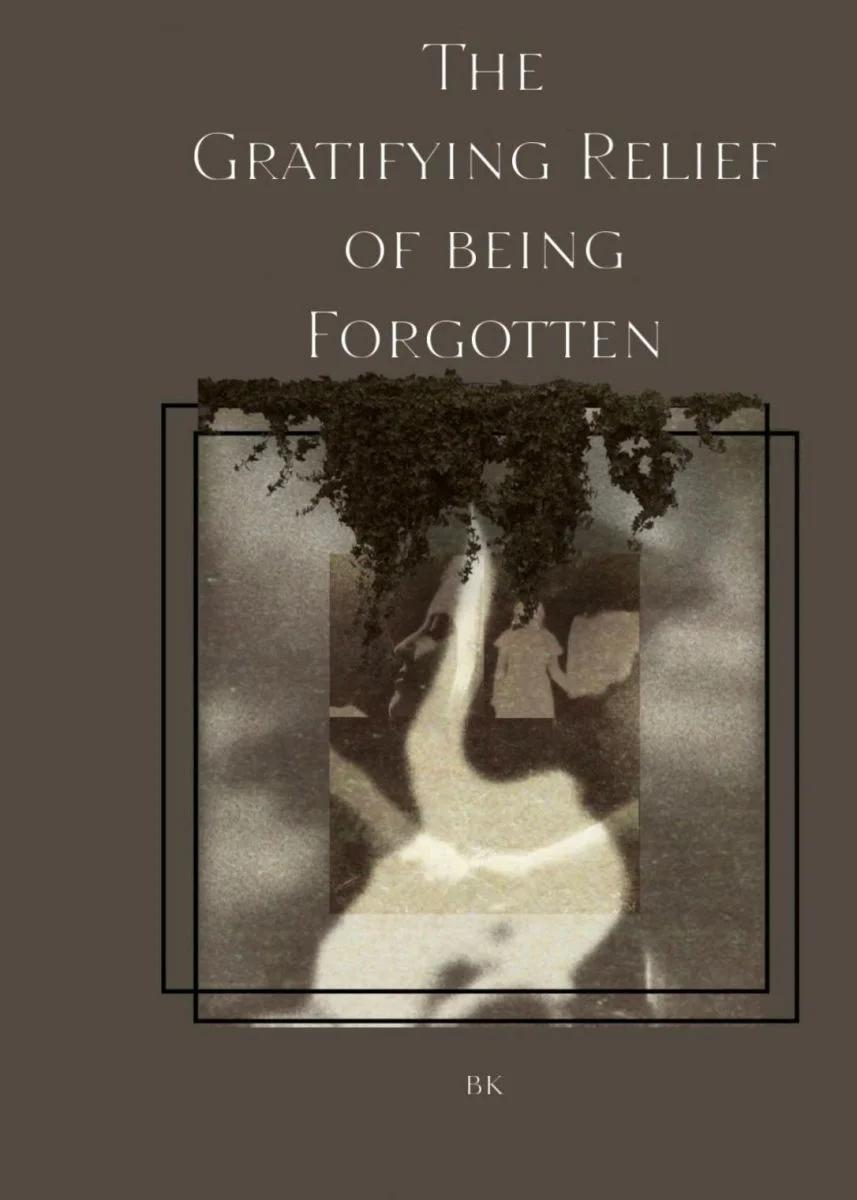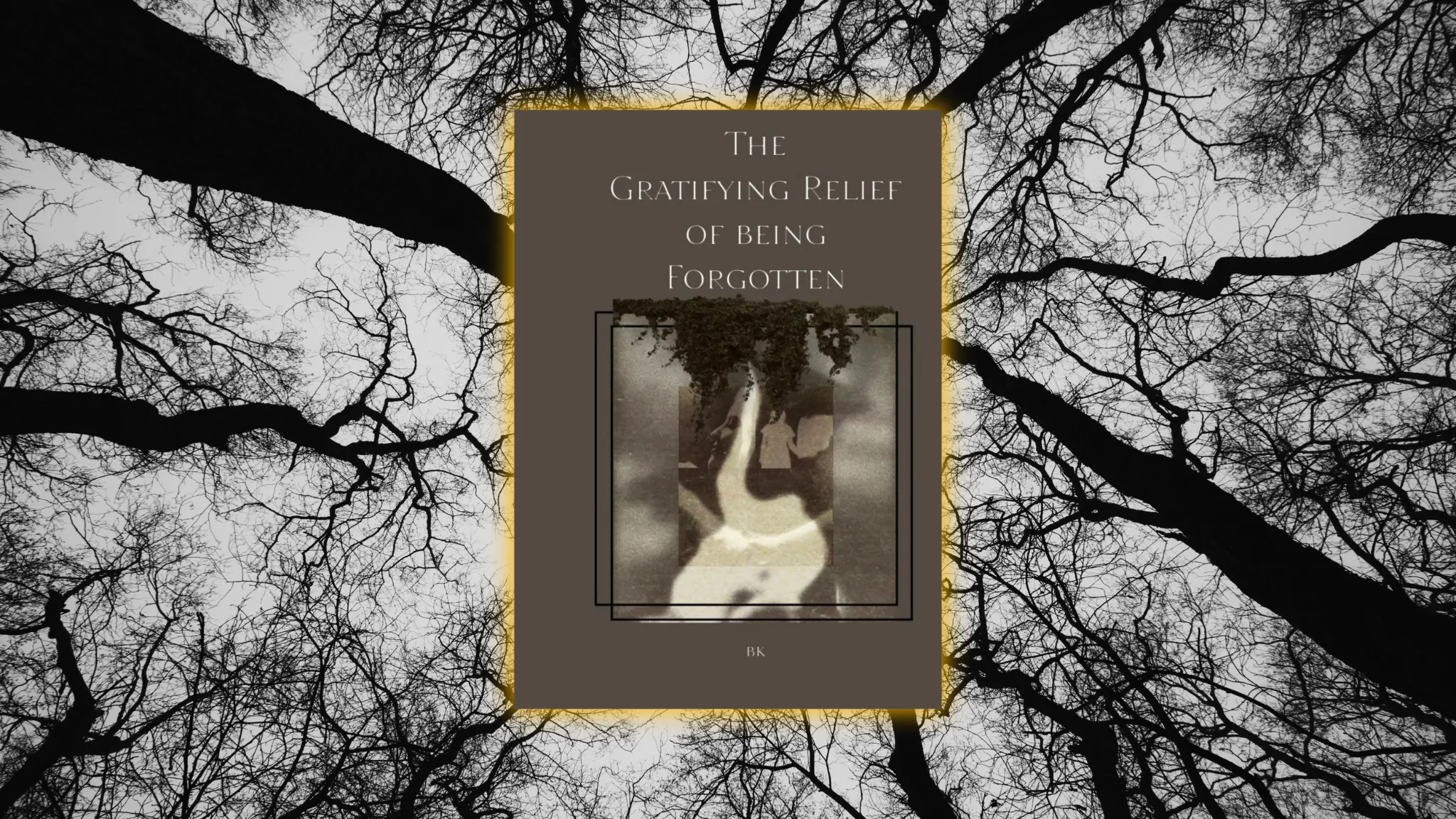The Gratifying Relief of Being Forgotten by BK
The Gratifying Relief of Being Forgotten by BK is a bruising and beautiful exploration of grief, longing, self-erasure and the persistence of love in its most destructive and redemptive forms. Moving between aphoristic fragments, longer narrative poems, typographic experimentation and a prose-poem sequence, BK constructs a world where memory, nature, the self and others collide in a continuous negotiation of identity and survival.
Nature, Surrender and the Desire to Be Consumed
The opening poem sets the emotional and aesthetic tone for the entire collection. Invoking “Natura non constristatur” (“Nature is not saddened”), the poet imagines her decaying body rejoining the earth: “allow me to be the feast of the forest.” It’s an image that recurs throughout the book — being consumed by nature, by others or by memory. This surrender offers a strange kind of relief, a release from the burden of selfhood.
Nature appears throughout the book not only as metaphor but as spiritual conduit. In one of the most vivid pieces, the poet describes her father communing with divinity through the landscape: “Wind rushes through the ponderosas… butterflies and dragonflies bounce from plant to plant… This is where he talks to God.” Here, nature is not a backdrop but a medium, a place where the emotional and the spiritual merge seamlessly.
Longing for the Past and What Time Steals
Other poems explore the painful friction between adolescence and adulthood. In “sunny but raining,” the adult child living at home longs for the simplicity of childhood and fears the burdens of adulthood, the last two lines delivering an especially sharp ache: “You couldn’t wait to grow up but / You wish you could have waited a little longer.” This theme also recurs in poems about regret for the times we weren’t present enough: “So busy trying to capture the moment / We forgot to live it.”
There is a sense of dissolution of self through time, such as in a poem in which the narrator describes returning to the places of childhood: “I’ve lost myself again… I wake up, but I am still not there. … I’ll go home / and sit with whoever is in this body.” Or in this short verse: “Chasing that feeling from three summers ago. I can never again live up to who I used to be.”
Emotion, Logic and the Need to Be Seen
The collection is also rich in emotional self-interrogation. The poet frequently questions her own need for validation and fear of vulnerability: “I find myself trying to explain when I feel a certain way / as if just feeling it isn’t explanation enough.” This frustration builds into harder truths — especially the painful realization that suffering must often become visible before others acknowledge it: “Why must I first fall to pieces for people to believe I was broken in the first place?”
These refrains accumulate into a moving portrait of a narrator negotiating visibility, vulnerability and worthiness, and the desire to simultaneously disappear and be seen.
Longing, Self-Effacement, and Unrequited Love
Longing — for people, for places, for former selves — runs like a river throughout. At times, it is connected inextricably with silence and self-erasure: “There are too many people that I would have done absolutely anything for if they had given me the chance. / But I just stood there at the mouth of the ocean begging it to take me in with all of its force.”
Love, in these poems, is tender, ruinous or both. Childlike devotion appears in one piece called “Jupiter & Io” — “I knew very little about love but I loved you… in every way I knew how” — only to be countered by the aching regret of another: “I can’t believe that I loved you with everything I had… it’s more of an ache now.” This deliberate juxtaposition of innocence and disillusionment underscores the book’s larger preoccupation with how love transforms us and how it echoes long after it ends.
Self-Neglect and Identity
Many poems portray the aching, sometimes toxic devotion that underlies fraught relationships — including one of the collection’s most striking self-portraits, exploring self-neglect as a kind of emotional contortion in service of others: “my body means nothing to me. i think it is just a vessel for the things i can do to make others happy.”
Elsewhere, the narrator dismantles herself entirely in service of others: “I break myself into tinier pieces… Is this one small enough? Is this one what you’d like me to be?” Identity becomes something inherited, fragmented and absorbed: “I still use the pinky promise my best friend taught me in middle school… Every part of me is made up from someone else.”
Other standout lines show the poet reckoning with inheritance: “I got it from my mom, / Who got it from her mom, / And hers, / And hers…” The longest poem in the volume — a prose-poem sequence rich with concrete imagery — deepens the collection’s themes by grounding them in childhood landscapes, parental influence and the shaping forces of early memory. It offers a pause in the emotional storm while reinforcing the book’s central truth: that identity is inherited, constructed, continually questioned and at constant risk of dissolution.
Form and Function and the Power of Endings
BK’s poems demonstrate a powerful command of image, rhythm and emotional pacing — especially in their final lines, which frequently turn like a knife or open like a door. The punchline-like twist in this example is stellar: “I wanted to kill myself in the way that you’d want to kill something coming after you. / it’s only self-defense.”
BK is particularly skilled at pairing the right idea with the right form, alternating between short, distilled observations and emotionally complex longer narratives. Many of the shorter poems pack a surprising amount of punch. “Hiraeth,” for example — pithy, precise and painfully resonant — encapsulates the word’s deep longing in just four brief lines.
A typographical poem visually sharpens the idea that our traumas create scars that shape us rather than heal us. Surrounding an asterisk are the words, “I / never / grew / out of / it, / just / grew / around / it.” Another typographic poem, centered on the page, shrinks the narrator down to the size of a period: “I made myself so small / that I became / nothing / at / all / .”
Violence, Forgiveness and the Underlying Threat of Harm
There is an undercurrent of violence in some of the relationships the poet describes — sometimes explicit, sometimes emotional, sometimes self-directed. One quiet, cutting poem exposes a pattern of self-sacrifice so ingrained it masquerades as virtue: “I will always be quick to forgive / as if me being angry is so much worse than / whatever you could possibly do to me.”
An unforgettable poem about a dragon killed before it can attack a village captures the psychology of abusive attachment: “Is it a blessing? / That the head of this dragon / was cut off … I would have stayed in my bed and let the fire engulf me, just to feel your warmth.” Despite the underlying threat of harm, there is still a kind of courage in these verses, such as in these perfect, taut lines: “We laugh in the face of death as to hopefully throw it off our scent. / Even if I am not afraid of the wolf, / it will still hunt me.”
The Complexities of Grief
Grief, in this book, is messy, volatile and profoundly human. The long poem “death by sunset” wrestles with the guilt of healing: “Is it okay to be happy?… your spirit lifts itself up… and guilt taps you on the shoulder and asks if you’ve really already forgotten.” One especially powerful poem captures the way death idealizes: “This grief is terminal. / I would give anything while I am living / to be as loved as you are even in death.”
Many pieces confront the contradictory nature of missing someone who caused both deep love and deep harm, grappling with simultaneous relief (“After, everything / I had the horrid realization / that I was finally free”) and longing (“I loved you so loudly it echoed even beyond your grave”). The same ambivalence appears in this gem: “And now I fear sleep because I might see you, / And worse, I will wake up alone.”
Survival and the Hard-Won Beauty of Living
Across the collection, the poet reveals a mind that studies its own wounds with both gentleness and ferocity. “Out of the destruction of you, came the creation of me,” BK writes, affirming survival not as triumph but as ongoing practice. Later: “When you make it out of Hell… you start to move too. Shine, too. Bloom, too.”
Even in the darkest moments, there is a persistent belief in beauty — and in the possibility of renewal. The final truth the collection arrives at is one of fierce resilience, that strength lies not in stoicism, but “in being able to find the joy… to continue seeing the beauty in things” despite devastation.
The Gratifying Relief of Being Forgotten is a powerful, deeply human act of emotional excavation. It is not afraid to be vulnerable or contradictory or devastatingly honest. It cuts deeply into the places where love and pain converge. It is a book that bleeds, remembers, mourns, yearns and resurrects. It will resonate deeply with readers who understand grief not as a singular event but as a lifelong companion; those who know the complicated relief of being forgotten and the equally complicated longing to be seen; and those who experience the past as both sanctuary and trap.
Above all, though, The Gratifying Relief of Being Forgotten is a collection that reminds us that survival is sometimes quiet, sometimes violent, but always miraculous.
About BK:
Buy this Book!
Barnes & Noble

